News
Carol Keenan: A Privilege
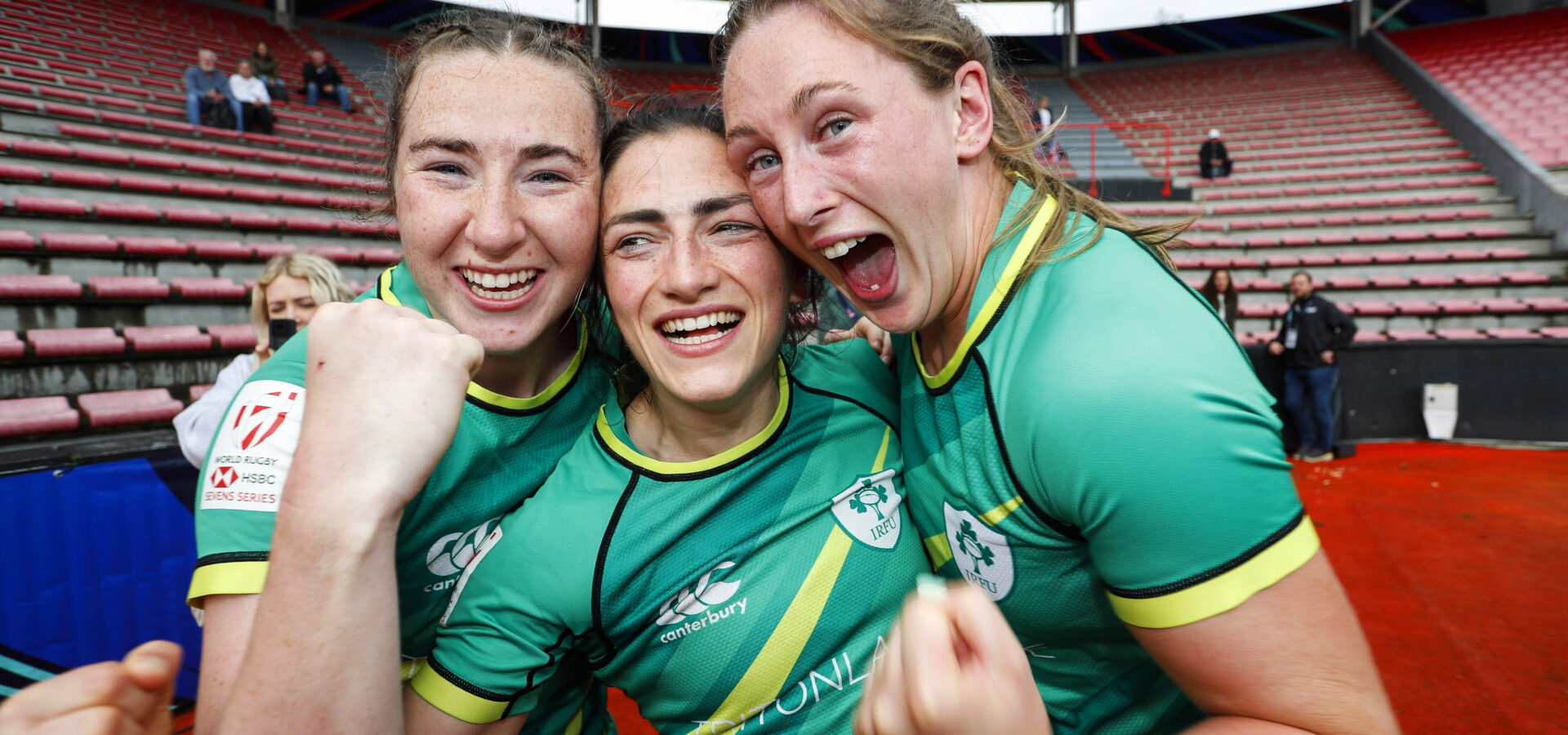
This month, Carol Keenan will move on from her role with the Irish Sevens Programme. After a historic week, Carol reflects on the journey she has been on with the players.
I’ve been a Player Development Manager with the Irish Sevens since April 2021. I was one of those people who started a job mid-pandemic. When I was offered the position, Deirdre [Lyons] outlined that relationship building would be my core KPI – a tall order over Zoom from home. Distance can be the nature of Sevens though so it’s something I had to get used to anyway. In those first few weeks I placed my focus on the injured players and those not selected to travel on the World Series. It helped build some momentum.
When I first walked in the door at the High Performance Centre (HPC), I had major imposter syndrome. I was surrounded by some of the best athletes and staff in the world of sport and thought, ‘Jesus, am I going to be able to add anything of value here?’ I had to adjust my thinking and I brought it back to what I have done throughout my career – focus on the individual. They are amazing athletes but they are people first and foremost. Once I got to know them I began to recognise that the groups are quite different.
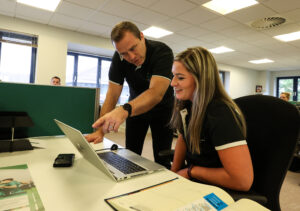
Mandatory Credit ©INPHO/Billy Stickland
On the men’s side, a lot of the lads come in from the academy system where they will have had experience of a professional rugby environment. With that experience comes non-selections and injuries. That means that when they land into the programme they already have an awareness that they cannot put all their eggs in one basket. Very quickly I identified that they needed more support around their education and future careers. Once we got the ball rolling though the main challenge was trying to get them to slow down. They are such driven individuals that they just want to get things sorted whereas I have to ensure they’re properly aware of their interests and strengths before they rush into any planning.
It’s well known that the Sevens programme doesn’t pay as well as the Men’s XVs and so to sustain their ambition in the game, most have to diversify by getting flexible part time jobs to help pay the bills. Having another focus can also keep a player going. For example, Gavin Mullin has successfully collaborated his accountancy traineeship in PWC with his rugby and it has proved vital over the course of his recent ACL rehab. It’s very much accepted these days and so the squad now has guys who are in traineeships in auctioneering and legal practices while several more are giving back through rugby coaching in schools and clubs
From the women’s perspective, it’s slightly different. Players entering over the past few years have never experienced the intensity and expectation of a professional set-up before. A lot of my work has therefore been in helping them adapt to their new world. They have to mature very quickly. A lot of the girls know that the potential in their sport is massive. The result is that we now have loads of them jumping at the chance to become professional rugby players and while it’s a terrific opportunity, there is a tendency to throw on the blinkers. The challenge for a PDM is ensuring they don’t entirely lose focus on what lies beyond their playing career.
Don’t get me wrong, a lot of the girls are in college or holding down jobs too. Katie Heffernan works in Grant Thornton as a Financial Advisor while Output Sports have employed both Emily Lane and Aoibheann Reilly on flexible contracts. We just need to remember that as excitement builds around female athletes we need to ensure they are encouraged and supported to pursue dual careers too so they are prepared for the inevitable transition out of professional sport. There can also be a performance benefit too. It’s a pretty intense bubble to be in so I spend a bit of time convincing the younger players of the need to get out of the zone now and then. They can burn themselves out by spending too much time in one space.
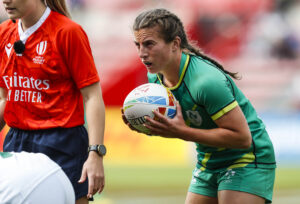
Mandatory Credit ©INPHO/Martin Seras Lima
The senior girls are a brilliant example in that sense. They all have a good education behind them and are holding down roles. My hope is that when the IRFU pathways programme led by Gillian McDarby gets up and running, education and the dual career piece will simply form part of the jigsaw.
When I speak to employers I explain what demands are being made of the players. I think it’s proper practice to manage expectations. There’s no point in employers thinking that they can get a high-performing individual into the office five days a week. They have to buy-in to the package, understand the skills an athlete can bring and see that they are investing in a future leader for their organisation.
After school, I studied Finance and went on to become a business and accountancy teacher followed by becoming a Guidance Counsellor. I worked in the University of Galway as a Career Development Advisor who very kindly allowed me to take a career break which has given me the space to pursue this path in sport. I currently lecture part time in Technological University of the Shannon. I’m sure my parents spent a lot of time freaking out with my career changes but in my opinion they all form part of my portfolio.
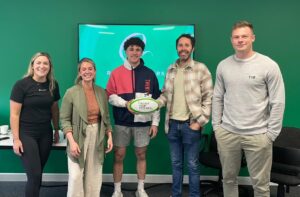
It turns out that my experiences help me in understanding the kind of emotions people have as they test out different roles. The panic that can set in. The doubts. I have also used that experience to help the younger players bed into the programme. I think I connect with them because I know how it feels to be thrust into a different setting, to be told to hop on the treadmill and to start running.
In many ways, players who come through the door already have my utmost respect because they have chosen a different path to most. Even though I also work with the Sport Ireland Institute I didn’t actually come from an established sports career. I was one of those kids who was told: ‘cop on! There are no jobs in sport.’ It seemed to have been a common phrase back in the day. Nowadays whenever players come to me with doubts about wanting to work in the fashion industry or something like that, I tell them: ‘well, someone has to work there, so why not you?’
Looking back over my time working with the Sevens programme, an obvious highlight was watching the girls achieve their goal of qualifying for Paris 2024 over what was a nervy weekend! I am positive that this is only the start. I have already bought my ticket for the bronze, silver and gold medal matches at the Olympics and I’d advise everyone else to get theirs too. This team are carving out a pathway for Irish women’s rugby and their history making days for Irish sport is only beginning. They will medal. Watch this space!
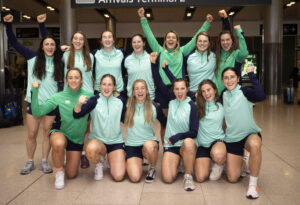
Mandatory Credit ©INPHO/Tom Maher
As my time with them comes to an end, I feel a real sense of pride that I have had the opportunity to play a part in supporting a brilliant team. Most of my work with them has been through individual conversation, problem solving, planning and motivating. I really enjoyed getting to know them on all on an individual level. There have been tough days but plenty of good ones too – especially when Stacey [Flood] decides to make me a coffee!
It’s been an especially intense few weeks as they built towards Toulouse but in that first game against France, I could literally see the trust they had in one another. The internal belief driven by Lucy [Mulhall] radiated from each player. They were really enjoying themselves. As I have said to them more than once: ‘if it was easy everyone would be doing it’. They are world class and left no stone unturned in getting to where they deserve to be.
Another highlight has been the openness of the lads to the dual career concept. When I first started there was a reluctance to it because they felt that there was no employer out there who would buy into it. I had to reframe their view of it and I put it to them that businesses have so much to gain. Fair enough there were few blocks in the road but if you look across the squad, so many of them are in settled roles now. It’s been a huge step for the Sevens culture.
There’s a lot going on and it can be tough to soak it all up sometimes. I really feel for players who lose out on a contract or have shipped a bad injury. Other things go on in their life too. I’m an emotional person and sometimes my empathy towards someone’s situation can sometimes mean I end up taking on what they are sharing. As a Guidance Counsellor I have developed good counselling skills but you can’t help but wonder whether you have said the right things in certain situations and it can weigh on you. Whomever I work with though, I make it clear that I’m not a psychologist. I operate as a signpost to our network of clinicians.
I would openly say that I use Rugby Players Ireland’s mental wellbeing service. It helps me to offload and reflect with trained professionals and I find it good for my mind. As I say to the players, they wouldn’t miss a gym session so why miss a session for your mindset? As the educational theorist, John Dewy states “we don’t learn through experience we learn through reflecting on experience.” I am always willing and seeking to learn which I think is important for everyone to strive to do in life.
Looking ahead, I believe that Sevens rugby will continue to grow in popularity. We’re living in a TikTok world and children’s concentrations levels are quickly being sapped away. In the years to come it’s going to be a challenge to have the next generation sit for 80 minutes to watch a rugby game unless there’s something else going on. You see it with the NFL and all that goes on around the games.
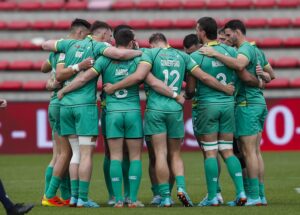
Mandatory Credit ©INPHO/Martin Seras Lima
In Sevens, the environment is always changing. The games come at you thick and fast and each fixture means something different. I think it will suit the generations to come it’s just whether it can get through to them. To help the players grow the game Evanne Ní Chuilinn came in to explore how the squad can make better use of their profiles. We all agreed that the message is education of the game through the players’ voices. You always see Irish players at the top of the tackling charts and impact ratings. They’re supreme athletes. More people should know about athletes like Amee-Leigh Murphy Crowe or Jordan Conroy. Terry Kennedy is the best Sevens player in the world but is more famous in other countries than here!
My hope is that Olympic qualification and more success on the World Series will give Sevens the platform it deserves. The players have worked so hard day on day for years, and the support team around them have applied their expertise to support that success. I hope the girls reap their rewards in Paris and beyond. The men made it to Tokyo and I know they have played a vital role in helping the women’s preparation for qualification through challenge games and friendships. I’m looking forward to seeing them qualify for the Olympic Games too over the next few weeks.
They are uniquely resilient and driven groups of people with a special bond that will last for a long, long time. They have been a privilege to work with and I have formed relationships I will never forget.
Back to NewsLatest Posts

Irish Athletes Alliance Statement: Safeguarding of Athletes

Cross Code Cycle Challenge

Highlights: June 2024
















